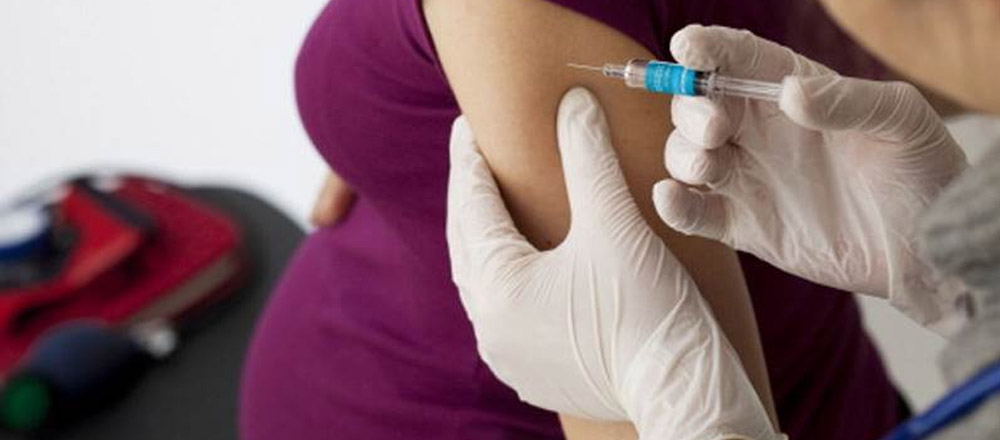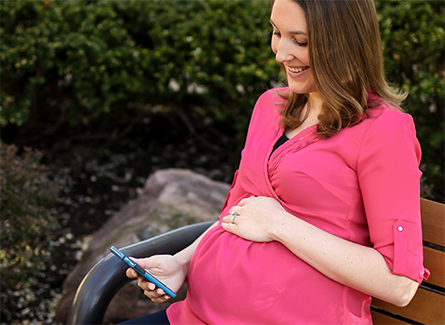Vaccines Vital for Pregnant Women
February 16, 2020By: Amanda Humiston
Categories: Gynecology, Live Healthy, Maternity

In October 2019, the Centers for Disease Control and Prevention reported pregnant women in the U.S. oftentimes do not receive two vaccinations vital in protecting themselves and their babies.
According to the CDC, only one in three pregnant women receive flu and whooping cough vaccines. In a baby’s first few months of life, influenza and whooping cough can be deadly.
The CDC recommends all pregnant women receive flu and Tdap vaccinations during each pregnancy. Both have been given safely to millions of pregnant women over many years as a means to help protect pregnant women and their developing babies. Pregnant women who get vaccinated pass antibodies to their developing babies, which protects newborns for several months.
Flu Vaccine
Whether a patient is pregnant, thinking about getting pregnant, has recently given birth or is breastfeeding, getting a flu shot is an important step in protecting against the flu.
The vaccine reduces a woman’s risk of getting the flu, which if acquired during pregnancy may cause pneumonia and require hospitalization. Women with influenza are more than twice as likely to be hospitalized if they are pregnant, and the vaccine reduces respiratory illnesses in pregnant women caused by the flu by 50%.
The vaccine is protective of newborns for as long as a few months after birth, when babies are too young to get vaccinated. As well, family members and friends should get an annual flu vaccination. In addition to protecting themselves, they safeguard newborns, people who are immunocompromised and others around them.
Flu Vaccine Side Effects
Pregnant women may experience the same mild side effects as those of others people. If side effects occur, they begin shortly after the shot is given and last one to two days. They include:
Additional Precautions
Although the flu vaccine is the best protection against the flu, routinely practice these precautions:
- Avoiding close contact with people who are sick
- Covering the mouth and nose when coughing and sneezing
- Washing hands frequently
- Fainting
- Fatigue
- Fever
- Headache
- Muscle aches
- Nausea
- Soreness, redness and/or swelling from the shot
Flu symptoms include:
- Chills
- Cough
- Fever
- Headache
- Muscle or body aches
- Runny nose
- Sore throat
Pregnant women and women up to two weeks postpartum who have symptoms of the flu should contact their healthcare provider to get an antiviral medication, regardless of whether they have had a flu shot.
It’s recommended these women take an antiviral medication within 48 hours of symptom onset, although doing so any time after symptoms appear helps the severity of flu symptoms and shortens the course of the illness.
Whooping Cough
One-half of babies who get whooping cough end up in the hospital, and 69% of reported whooping cough deaths occur in babies less than 2 months old. Pregnant women should protect their newborns by getting a Tdap vaccination during their third trimester. Tdap protects against whooping cough, as well as tetanus and diphtheria.
As with the flu vaccine, protective antibodies created by mom are passed on to her baby, giving the baby protection in its first months of life. Getting a Tdap vaccination between 27 weeks-36 weeks of pregnancy is 78% more effective at preventing whooping cough in babies younger than 2 months old.
Anyone around babies – fathers, grandparents, aunts, uncles, children and friends – should be current on their whooping cough vaccination. Immunity fades every 10 years, but getting a Tdap booster at least two weeks before visiting the baby provides the best defense.
The post Vaccines Vital for Pregnant Women appeared first on True North.



